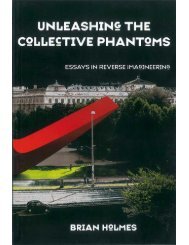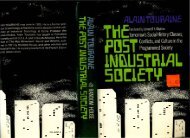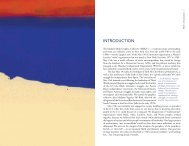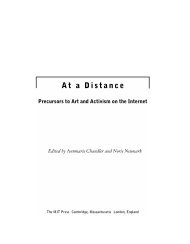Plagiarism: Art As Commodity and Strategies for ... - El plagio literario
Plagiarism: Art As Commodity and Strategies for ... - El plagio literario
Plagiarism: Art As Commodity and Strategies for ... - El plagio literario
Create successful ePaper yourself
Turn your PDF publications into a flip-book with our unique Google optimized e-Paper software.
"TERROR BIKERS, PC DEAD; SIR FRANK FIGHTS FOR LIFE"<br />
<strong>and</strong>:<br />
"MARAUDING GANG PILLAGES HOME OF SIR FRANK RUTLEDGE"<br />
These examples are quoted to show the extent to which the media had colonised all areas of cultural<br />
(<strong>and</strong> sub-cultural) life by the early seventies. By the eighties, if one wanted to speak at all,<br />
there was no viable alternative to entering the media's discourse. The success of groups such as<br />
'Class War' demonstrates this 'fact'. By using media techniques (some literally learned from Allen -<br />
<strong>for</strong> example the phrase 'the New Breed' was taken straight out of "Boot Boys" <strong>and</strong> placed in the<br />
pages of "Angry" by a school-aged supporter of Class War living in Stirling), Class War made its<br />
voice heard. This was effective propag<strong>and</strong>a — the media coverage of the 'anarchist menace' in East<br />
London is amazing considering that there were often no more than fifteen Class War members in the<br />
whole of London. The effect in 'real' terms was negligible, but its impact on the consciousness of<br />
the general population was considerable precisely because of the media coverage. I cite this to<br />
demonstrate a trend.<br />
Pauline Smith <strong>and</strong> COUM Transmissions<br />
In Allen's "Skinhead" the 'political views' expressed waivered between 'Strasserite' (albeit by<br />
implication) <strong>and</strong> conservative:<br />
"Roy nodded. Yes, he thought, I'll follow the bloody b<strong>and</strong>. I dare not go against<br />
it. He believed that Jack Dash was the man closest to God; believed fervently in the<br />
right of the docker — <strong>and</strong> every working man — to take measures to combat the capitalistic<br />
employer. He was completely disenchanted with this Labour government —<br />
but he couldn't abstain or vote Tory. He would vote Labour as he always had. It<br />
didn't matter what he said between elections — that the long period of Tory rule had<br />
been the best in living memory — providing that, when the day came, he could make<br />
his "X" against the local Labour Party c<strong>and</strong>idate. In his constituency — Plaistow —<br />
the ineffectual h<strong>and</strong>s on the helm of Engl<strong>and</strong> counted <strong>for</strong> less than a man's worth<br />
to an employer. 1926 <strong>and</strong> the "cloth-cap" image had to be preserved. Forgotten<br />
were the affluent days of Tory rule. Forgotten were the massive debts piled on a<br />
staggering nation by yet another Labour administration. It didn't count that Britain<br />
was being dictated to by the International Monetary Fund."<br />
By the time of "Terrace Terrors" (Allen's fourteenth novel) his "right-wing radicalism' had been<br />
moderated via Powellism to the worship of money. In this he prefigured the Thatcherite Tory<br />
nutters of the 1980's:<br />
"He followed Cochrane back up the incline, into a semi-finished series of plush box<br />
seats with private bar being built at the rear of the glass enclosed spaciousness. This<br />
was his first experience of the style to which directors had become used <strong>and</strong> he liked<br />
the feeling permeating him. One day...<br />
Cochrane caught the admiration, the puffing chest. He recognised the signs. Recalled<br />
the day he'd taken his first tentative steps up the money ladder."<br />
In contrast, the "mail artist" Pauline Smith enjoyed none of the financial rewards that Allen<br />
attained with his novels, <strong>and</strong> her 'right-wing radicalism' was rein<strong>for</strong>ced by the police raids her activities<br />
triggered. In "Corpse Club" (included in "About Vile", edited by Anna Banana, Banana Productions,<br />
Vancouver 1983) she writes:<br />
"All the hostility encountered during the time of the "Adolf Hitler Fan Club"<br />
was part of the event <strong>and</strong> where-ever possible incorporated into it. It is amazing<br />
how easily people living very much in the Permissive Society may still be shocked...<br />
"The Adolf Hitler Fan Club" developed gradually. There were references<br />
to Adolf Hitler in the second series of postal editions <strong>and</strong> even in other work made<br />
as long ago as 1970. Adolf Hitler was always interesting but I did not read "Mein<br />
Kampf" until 1971. At that time I was struck by the way Hitler's description of<br />
17






